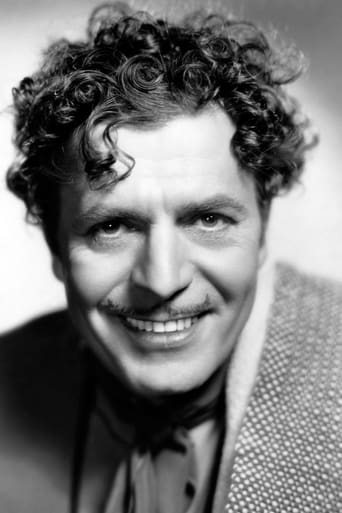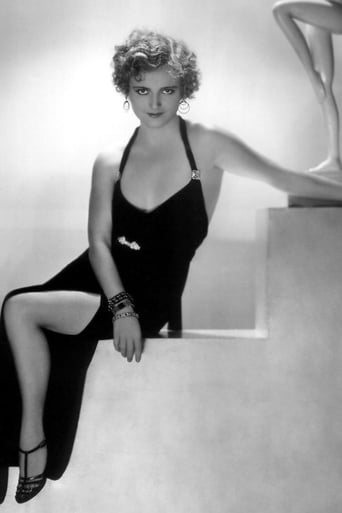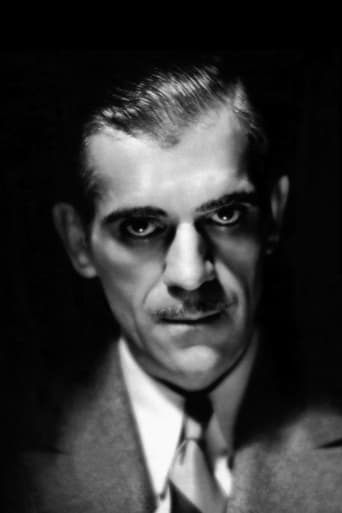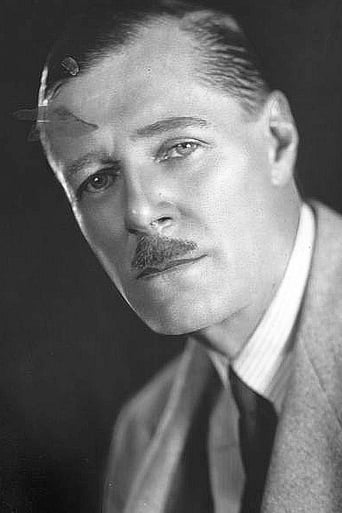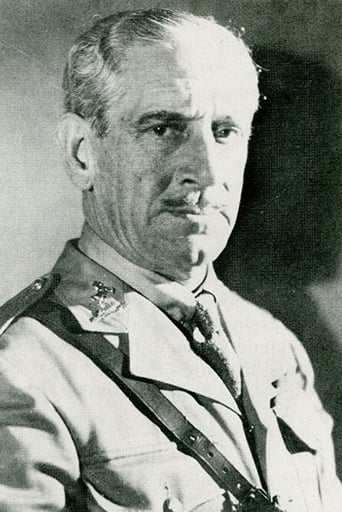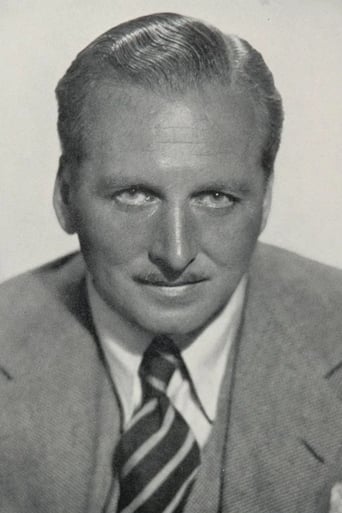ReaderKenka
Let's be realistic.
Afouotos
Although it has its amusing moments, in eneral the plot does not convince.
CrawlerChunky
In truth, there is barely enough story here to make a film.
InformationRap
This is one of the few movies I've ever seen where the whole audience broke into spontaneous, loud applause a third of the way in.
bsmith5552
"Behind That Curtain" is notable in that it was the first appearance of Charlie Chan at Fox who would go on to produce the long running series of Chan films between 1931 and 1942. It's rather dated but is not as bad a film as some would have you believe.The story is adapted from an Earl Derr Beggars novel about murder, love and deceit among the well to do. Sir George Mannering (Claude King) has hired investigator Hilary Galt (Edgar Norton) to dig up dirt on his niece's Eve's (Lois Moran) intended Eric Durand (Philip Strange). Explorer Colonel John Beetham (Warner Baxter) has concerns, that are never explained, over Galt's findings. Against her uncle's wishes Eve marries Durand. Then Mannering learns that Galt has been murdered and his files stolen.A pair of Chinese slippers are found on the body which implicates Beetham in the murder. Mannering disowns Eve and the couple go off to India to live. Eric Durand's occupation by the way, is never revealed. Anyway, Durand turns out to be a woman chasing rat, among other things and is caught by Eve fooling around with the house servant Nuna (Mercedes DeValacco).Beetham meanwhile has embarked on an expedition in India and runs into a distraught Eve in the market place. Eve tells him of her troubles and eventually leaves Durand over his affair and a mysterious letter that she has received. She joins Beetham's expedition and over a four month period the two fall madly in love. Beetham you see, has been carrying a torch for Eve lo these many months.Scotland Yard detective Sir Frederick Bruce (Gilbert Emery) meanwhile has taken up the chase in the murder investigation. Eve guarding a deadly secret, flees the camp and disappears. Fast forward a year and Eve turns up in San Francisco still on the run. Both Durand, and Sir Frederick have followed her there. Purely coincidentally, Beetham turns up to deliver a lecture. Sir Frederick working with Chinese Inspector Charlie Chan (E.L. Park) set a trap to capture the murderer and...................Although this is supposed to be a Charlie Chan mystery, he doesn't show up until near the end of the film. The detective work in this story is handled for the most part by Sir Frederick. Chan is portrayed by Asian actor E. L. Park who was a bald middle aged gentleman who has little to contribute to the overall story.Boris Karloff in his first sound film, plays Baxrer's Indian manservant. He would appear in another Chan film, "Charlie Chan at the Opera" in 1936.
blanche-2
"Behind That Curtain" can be described in one word: agonizing.Some caveats. Historically it is wonderful to see. It is the sound debut of Boris Karloff and of Charlie Chan, who has a very small role in this.Back in 1929, actors were still learning how to handle talkies. It was an awkward time. The camera was stationary, for one thing.The style of acting was different, and so was the style of script."Behind That Curtain" is a good example of flowery, maudlin dialogue ("Do you know what it's like for a man like myself to envision you every night in that other tent? Looking upon the same desert?") and actors over-enunciating - worse than that, speaking slowly with huge pauses. "Did...you...find...any...thing." Also there was a lot of a dramatically stated "Do you mean..." without finishing the sentence -- usually regarding something sexual.In the story, a man hires a detective to investigate his niece Eve's (Lois Moran) fiancé Eric (Philip Strange). Her uncle believes he's only interested in her money. An old friend, John Beetham (Warner Baxter), who is in love with Eve himself, visits during this time. The detective is found dead. Eve and Eric marry anyway and move to India.It turns out uncle was right - Eric is a lazy brute who has moved his mistress/maid into the house and is constantly taking Eve's money. Desperate to get away from him, when John passes through India on an exploration, she begs him to take her along. Separate tents. The police haven't given up on the detective's murder, and they find Beetham to question him, and know that Eve is with him. Eve hides from them and then disappears, winding up in San Francisco. That's where Chan (E.L. Park) comes in.In the second part of the film, Lois Moran's rhythm picks up. Attractive and somewhat androgynous with her short haircut, she is an appealing actress saddled with over-dramatic speeches - I would love to see her in something else. Back then, Warner Baxter was tall and dapper, not the older, somewhat defeated personality of later years. He handles the dialogue pretty well, probably the best of everyone. Karloff plays his manservant and gets the big line "The desert gives and the desert takes away." Just know what you're in for if you decide to watch this. It's interesting to see how acting styles have changed since then, becoming much more subtle now, but also how someone like Baxter could seem more modern, as could Barrymore, Fairbanks Jr., and others.
Rosabel
This film is of historical interest, as the first appearance on film of the Charlie Chan character, even though he doesn't appear until about 50 minutes into the movie, and is in only 3 scenes. But as a movie, it is almost intolerably bad. The actors were obviously very unsure of themselves, making the transition from silent to sound movies. I've seen Warner Baxter in silent films, and he was by no means as frozen as he was in this movie. Now and then he relaxes, and his dialog becomes a bit more natural, as it would be a few years later in a film like "42nd Street". But here, he seems flummoxed by the need to actually MEMORIZE lines - there are several moments where he speaks hesitantly, for all the world as if he just couldn't remember the line, and can no longer just say whatever he wants, as one could in a silent film.Baxter is not the worst offender - the character of Mr. Galt (destined to play the melancholy role of "The Body") speaks so slowly and with such exaggerated pronunciation, is just terrible. Many of the actors appeared to be falling back on stage performance techniques, with loud emoting and over-enunciation, and as a result they over-powered the camera - or they would have, if their loud, artificial voices hadn't been combined with near-immobility. Everyone seems afraid to move - they plant themselves in one spot, then roar out their lines.The camera-work is also very unimaginative for the most part, with one notable exception - the camel caravan traveling over the desert was quite beautifully photographed. It's probably not a coincidence that the scene was purely visual - when the filmmakers could fall back on the more familiar silent movie techniques, they seemed much freer and imaginative. The new technology, by contrast, introduced awkwardness and seemed burdensome.The plot and the script were both very lame. The murderer is revealed very quickly, and mystery is replaced by a love triangle and a romance. Eve, the heroine, overacts horribly, with lots of head-bobbing and wriggling to convey her anguish. Her motivation is completely unbelievable - married to a murdering psychopath who has every reason in the world to kill her, she persists in fleeing from the police, and refusing to help convict him, even when her own life is at stake, and the police have hard evidence anyway, and there is no chance he can escape justice.The script does deserve some credit for treating a theme like adultery in a rather surprisingly hard-edged way. There's no softening of the despicable betrayal, or of the heroine's painful discovery that her husband has been sleeping with their Indian maid - she even finds the latter's earring in her own bed! She has her own moment of temptation later on, but resists with the time-honored line, "After all, he IS my husband!" It's a good reminder that the '20s were by no means a strait-laced decade - the tasteful expunging of sex in the movies came later. But then the movie ruins it by having Eve shrinking from divorcing her cad of a husband (one of my favorite lines, by the way: "Are-you-going-to------DIVORCE------me???") because she is afraid of the scandal. Divorce wasn't THAT big a scandal in the '20s, especially among the rich. Eve is always veering between put-upon, shrinking damsel in distress and unpredictable, capable woman on her own. The movie would have been far better if she had been portrayed as a strong, modern woman throughout, but that Eve would never have been so stupid and sentimental as to leave a murderer roaming the streets.
skoyles
Among the necessary attributes of any motion picture, old or new, colour or black and white, widescreen or television, is that the presentation must be satisfying on some level. "Citizen Caine" satisfies our sense of balance; "Gone With the Wind" our sense of honour; "Star Wars" our sense of adventure; "LA Confidential" our sense of justice while numerous mysteries satisfy our need for a neat solution to the problem presented. The satisfaction need not be poetic nor even to our liking but we must be able to say, "At some level this movie was a satisfying experience." "Behind that Curtain" is not. While the historical interest of the exotic locales is fun, the acting is acceptable for the time, seeing Karloff, Baxter, and Park as Chan is fine, the satisfaction factor is zilch. IMDb is rightly leery of "spoilers" in reviews; no such warning is necessary for this creaking amateur script. As one looks for possible solutions to the "whodunit", one wastes one's time. Alas, a disappointment which proves yet again that without a good story no motion picture can succeed.
